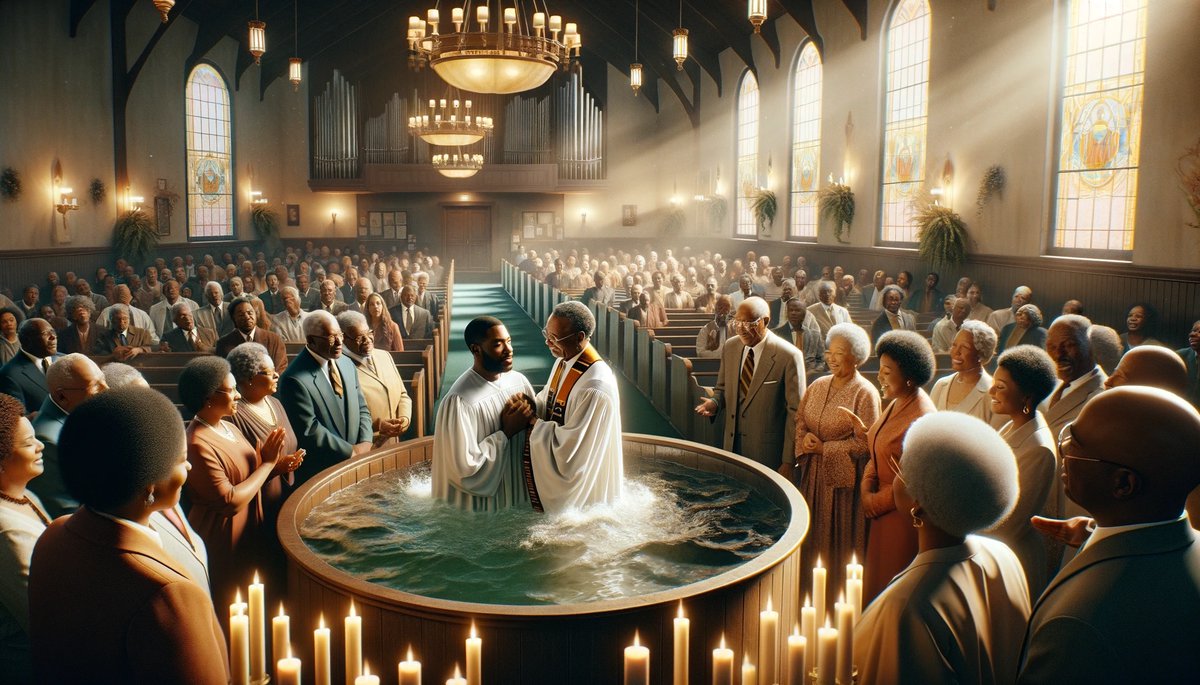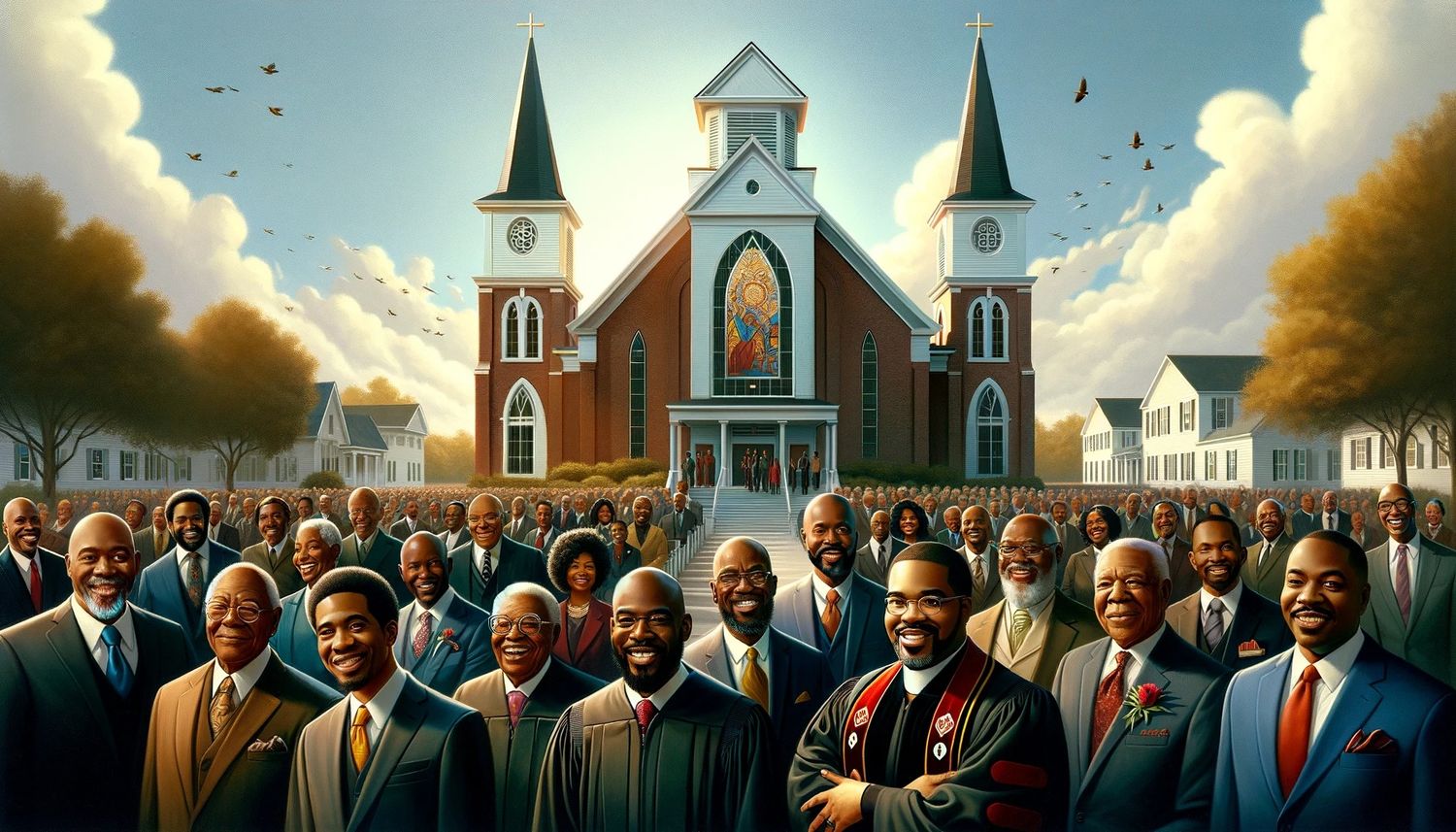Home>Theology and Spirituality>How Many Types Of Baptist Are There


Theology and Spirituality
How Many Types Of Baptist Are There
Published: February 21, 2024
Peter Smith, Editorial Director at Christian.net, combines deep insights into faith, politics, and culture to lead content creation that resonates widely. Awarded for his contributions to religious discourse, he previously headed a major organization for religious communicators, enhancing dialogue on faith's societal impacts.
Discover the various types of Baptist denominations and their unique theological and spiritual perspectives. Explore the diversity within Baptist traditions.
(Many of the links in this article redirect to a specific reviewed product. Your purchase of these products through affiliate links helps to generate commission for Christian.net, at no extra cost. Learn more)
Table of Contents
Introduction
The Baptist denomination is a diverse and vibrant branch of Christianity, encompassing a wide array of beliefs, practices, and traditions. With a rich history dating back to the 17th century, Baptists have evolved into numerous distinct groups, each with its own theological nuances and organizational structures. Understanding the various types of Baptist denominations is essential for gaining insight into the multifaceted tapestry of the Baptist faith.
As we delve into the intricate tapestry of Baptist denominations, it becomes evident that the diversity within the Baptist tradition is a testament to the dynamic nature of religious expression. Each type of Baptist denomination carries its own unique theological perspectives, worship styles, and ecclesiastical governance, reflecting the multifaceted nature of human spirituality and religious interpretation.
Exploring the different types of Baptist denominations provides a fascinating glimpse into the rich tapestry of beliefs and practices that have emerged within the broader Baptist tradition. From General Baptists to Reformed Baptists, each denomination offers a distinctive lens through which to view the Christian faith, encompassing a spectrum of theological emphases and doctrinal interpretations.
As we embark on this journey through the various types of Baptist denominations, we will uncover the theological underpinnings, historical developments, and cultural influences that have shaped each distinct branch of the Baptist family. By gaining a deeper understanding of these denominational variations, we can appreciate the richness and diversity that characterize the Baptist tradition, fostering a spirit of inclusivity and mutual respect within the broader Christian community.
Read more: How Many Different Baptist
General Baptist
General Baptists represent a significant branch within the broader Baptist tradition, distinguished by their theological stance on the doctrine of general atonement. This belief asserts that the redemptive work of Jesus Christ extends to all individuals, offering salvation to humanity as a whole. General Baptists emphasize the universal scope of God's grace, advocating for the potential salvation of all people through faith in Christ.
Historically, General Baptists trace their roots to the English Reformation, with early proponents such as John Smyth and Thomas Helwys playing pivotal roles in the formation of this theological perspective. Their commitment to the principle of general atonement set them apart from their Particular Baptist counterparts, who held to a more limited view of Christ's redemptive work.
In terms of ecclesiastical governance, General Baptist congregations often embrace a congregational polity, granting autonomy to individual churches in matters of governance and decision-making. This emphasis on local autonomy reflects a commitment to the priesthood of all believers and the democratic functioning of the church body.
Worship practices among General Baptists vary, encompassing a range of liturgical expressions and musical styles. While some congregations adhere to traditional hymnody and structured liturgies, others embrace contemporary worship elements, reflecting the diversity of cultural influences and generational preferences within the denomination.
The theological landscape of General Baptists is characterized by an emphasis on free will and the responsibility of individuals to respond to the gospel message. This emphasis on human agency in the process of salvation aligns with their belief in general atonement, underscoring the potential for all individuals to accept the offer of grace extended through Christ's redemptive work.
In contemporary contexts, General Baptist denominations continue to uphold their distinctive theological convictions while engaging in ecumenical dialogue and collaborative efforts with other Christian traditions. This commitment to theological integrity alongside a spirit of cooperation reflects the enduring legacy of General Baptists as a vital expression of the Baptist faith.
The enduring legacy of General Baptists as a vital expression of the Baptist faith underscores their commitment to theological integrity alongside a spirit of cooperation and ecumenical engagement with other Christian traditions.
Particular Baptist
Particular Baptists, also known as Calvinistic Baptists, represent a significant theological stream within the broader Baptist tradition. The term "Particular" reflects their distinctive emphasis on the particular or limited atonement, a key tenet of Reformed theology. This theological perspective asserts that the redemptive work of Jesus Christ is specifically intended for the elect, those chosen by God for salvation, rather than being universally applicable to all individuals.
Historically, the Particular Baptist movement emerged in the 17th century amidst the backdrop of the English Reformation and the broader Protestant Reformation. Influential figures such as John Spilsbury and Benjamin Keach played pivotal roles in shaping the theological contours of this tradition, articulating a robustly Calvinistic understanding of salvation and divine sovereignty.
Particular Baptists adhere to a congregational polity, affirming the autonomy of local churches in matters of governance and decision-making. This commitment to congregational autonomy aligns with their emphasis on the priesthood of all believers and the democratic functioning of the church body, reflecting a deep-seated commitment to the principle of local church independence.
In terms of worship practices, Particular Baptist congregations encompass a diverse array of liturgical expressions and musical styles, reflecting the cultural and contextual diversity within the denomination. While some churches maintain a traditional approach to worship, incorporating hymnody and structured liturgies, others embrace contemporary elements, reflecting the evolving nature of worship preferences within the denomination.
The theological landscape of Particular Baptists is characterized by a robust emphasis on the sovereignty of God in salvation, the perseverance of the saints, and the authority of Scripture. These theological emphases align with the broader Reformed tradition, emphasizing the absolute sovereignty of God in the process of redemption and the assurance of salvation for the elect.
In contemporary contexts, Particular Baptist denominations continue to uphold their distinctive theological convictions while engaging in collaborative efforts and ecumenical dialogue with other Christian traditions. This commitment to theological integrity alongside a spirit of cooperation reflects the enduring legacy of Particular Baptists as a vital expression of the Baptist faith.
Free Will Baptist
Free Will Baptists represent a significant theological strand within the broader Baptist tradition, distinguished by their emphasis on the doctrine of free will and the universal offer of salvation. This theological perspective asserts that individuals possess the freedom to accept or reject the gospel message, underscoring the belief in human agency and the universal scope of God's redemptive grace.
Historically, Free Will Baptists trace their roots to the early 18th century in the United States, with figures such as Paul Palmer and Benjamin Randall playing instrumental roles in shaping the theological contours of this tradition. Their commitment to the principle of free will and the universal offer of salvation set them apart within the Baptist landscape, emphasizing the inclusive nature of God's grace extended to all humanity.
In terms of ecclesiastical governance, Free Will Baptist congregations often embrace a congregational polity, granting autonomy to individual churches in matters of governance and decision-making. This emphasis on local autonomy reflects a commitment to the priesthood of all believers and the democratic functioning of the church body, fostering a sense of ownership and participation among the congregation members.
Worship practices among Free Will Baptists encompass a diverse range of liturgical expressions and musical styles, reflecting the cultural and contextual diversity within the denomination. While some congregations maintain a traditional approach to worship, incorporating hymnody and structured liturgies, others embrace contemporary elements, reflecting the evolving nature of worship preferences within the denomination.
The theological landscape of Free Will Baptists is characterized by an emphasis on the universal offer of salvation, the freedom of human will, and the responsibility of individuals to respond to the gospel message. This emphasis on human agency in the process of salvation aligns with their belief in the inclusive nature of God's grace, affirming the potential for all individuals to accept the offer of redemption through faith in Christ.
In contemporary contexts, Free Will Baptist denominations continue to uphold their distinctive theological convictions while engaging in ecumenical dialogue and collaborative efforts with other Christian traditions. This commitment to theological integrity alongside a spirit of cooperation reflects the enduring legacy of Free Will Baptists as a vital expression of the Baptist faith.
Primitive Baptist
Primitive Baptists, also known as Old School Baptists, represent a distinctive theological strand within the broader Baptist tradition. The term "Primitive" reflects their commitment to preserving what they perceive as the primitive or original practices of the New Testament church, emphasizing a steadfast adherence to traditional doctrines and worship customs.
Historically, Primitive Baptists trace their origins to the early 19th century in the United States, with figures such as Elder Daniel Parker and Elder Gilbert Beebe playing pivotal roles in shaping the theological contours of this tradition. Their commitment to maintaining the purity of New Testament teachings and practices set them apart within the Baptist landscape, reflecting a deep-seated reverence for the historical roots of the Christian faith.
In terms of ecclesiastical governance, Primitive Baptist congregations often embrace a congregational polity, granting autonomy to individual churches in matters of governance and decision-making. This emphasis on local autonomy reflects a commitment to the priesthood of all believers and the democratic functioning of the church body, fostering a sense of ownership and participation among the congregation members.
Worship practices among Primitive Baptists are characterized by a steadfast adherence to traditional hymnody, a cappella singing, and a simplicity of worship that reflects their commitment to preserving the primitive customs of the early church. The absence of instrumental music in worship services and the emphasis on heartfelt, congregational singing underscore their dedication to maintaining the purity of New Testament worship practices.
The theological landscape of Primitive Baptists is characterized by a staunch adherence to predestination, unconditional election, and the sovereignty of God in salvation. These theological emphases align with their commitment to preserving what they perceive as the original doctrines of the New Testament church, reflecting a deep-seated reverence for the sovereignty of God in the process of redemption.
In contemporary contexts, Primitive Baptist denominations continue to uphold their distinctive theological convictions while maintaining a steadfast commitment to preserving the primitive practices of the early church. This dedication to theological integrity and historical continuity reflects the enduring legacy of Primitive Baptists as a vital expression of the Baptist faith.
Read more: How Many People Are Baptist In The Us
Missionary Baptist
Missionary Baptists represent a dynamic and mission-oriented strand within the broader Baptist tradition, characterized by a fervent commitment to evangelism, global outreach, and social engagement. The term "Missionary" reflects their proactive stance in spreading the gospel message and engaging in benevolent endeavors, both locally and internationally.
Historically, Missionary Baptists trace their roots to the 18th and 19th centuries in the United States, with a strong emphasis on evangelistic fervor and the establishment of mission societies to support missionary endeavors. Figures such as Luther Rice and Adoniram Judson played pivotal roles in shaping the missionary zeal that became synonymous with this tradition, advocating for the global spread of the gospel and the establishment of churches in diverse cultural contexts.
In terms of ecclesiastical governance, Missionary Baptist congregations often embrace a congregational polity, granting autonomy to individual churches in matters of governance and decision-making. This emphasis on local autonomy reflects a commitment to the priesthood of all believers and the democratic functioning of the church body, fostering a sense of ownership and participation among the congregation members.
Worship practices among Missionary Baptists encompass a diverse array of liturgical expressions and musical styles, reflecting the cultural and contextual diversity within the denomination. While some churches maintain a traditional approach to worship, incorporating hymnody and structured liturgies, others embrace contemporary elements, reflecting the evolving nature of worship preferences within the denomination.
The theological landscape of Missionary Baptists is characterized by a fervent commitment to evangelism, global missions, and social justice. This emphasis on proactive engagement with the world aligns with their dedication to spreading the gospel message and addressing societal needs, reflecting a holistic approach to ministry that encompasses both spiritual and practical dimensions.
In contemporary contexts, Missionary Baptist denominations continue to uphold their distinctive theological convictions while actively engaging in global missions, community outreach, and social advocacy. This commitment to proactive mission work alongside a spirit of cooperation and ecumenical engagement with other Christian traditions reflects the enduring legacy of Missionary Baptists as a vital expression of the Baptist faith.
Southern Baptist
Southern Baptists represent one of the largest and most influential denominational bodies within the broader Baptist tradition. With a rich history dating back to the 19th century, the Southern Baptist Convention (SBC) has played a pivotal role in shaping the religious landscape of the United States and beyond. The term "Southern" reflects the convention's historical roots in the southern region of the United States, where it has exerted a profound impact on the cultural, social, and theological fabric of the American South.
Historically, the Southern Baptist Convention emerged in 1845 as a result of theological and regional tensions within the broader Baptist community. The convention's formation was closely linked to the issue of slavery, with Southern Baptists advocating for the autonomy of individual churches in matters of governance and the preservation of local customs and traditions. This emphasis on local autonomy and regional identity has remained a defining characteristic of the Southern Baptist Convention, shaping its ecclesiastical governance and theological outlook.
In terms of ecclesiastical governance, Southern Baptist congregations adhere to a congregational polity, granting significant autonomy to individual churches in matters of governance, doctrinal interpretation, and mission engagement. This commitment to local autonomy reflects a deep-seated reverence for the independence of the local church and the priesthood of all believers, fostering a sense of ownership and participation among congregation members.
Worship practices among Southern Baptists encompass a diverse array of liturgical expressions and musical styles, reflecting the cultural and contextual diversity within the denomination. While some churches maintain a traditional approach to worship, incorporating hymnody and structured liturgies, others embrace contemporary elements, reflecting the evolving nature of worship preferences within the denomination.
The theological landscape of Southern Baptists is characterized by a robust commitment to biblical authority, evangelism, and missions. Central to their theological identity is a steadfast adherence to the authority and sufficiency of Scripture, undergirding their beliefs and practices. Additionally, Southern Baptists place a strong emphasis on evangelism and missions, actively engaging in efforts to spread the gospel message both locally and globally.
In contemporary contexts, the Southern Baptist Convention continues to uphold its distinctive theological convictions while actively engaging in evangelistic endeavors, social initiatives, and collaborative efforts with other Christian traditions. This commitment to theological integrity alongside a spirit of cooperation reflects the enduring legacy of Southern Baptists as a vital expression of the Baptist faith.
American Baptist
American Baptists, also known as the American Baptist Churches USA, represent a diverse and progressive strand within the broader Baptist tradition. With a rich history dating back to the 17th century, American Baptists have emerged as a distinctive expression of the Baptist faith, characterized by their commitment to social justice, ecumenical engagement, and theological diversity.
Historically, American Baptists trace their roots to the early colonial period in the United States, with figures such as Roger Williams and John Clarke playing pivotal roles in the formation of this tradition. Their advocacy for religious freedom, separation of church and state, and the autonomy of local congregations laid the groundwork for the development of American Baptist identity, emphasizing the principles of liberty, equality, and diversity.
In terms of ecclesiastical governance, American Baptist congregations embrace a congregational polity, granting significant autonomy to individual churches in matters of governance, doctrinal interpretation, and mission engagement. This commitment to local autonomy reflects a deep-seated reverence for the independence of the local church and the priesthood of all believers, fostering a sense of ownership and participation among congregation members.
Worship practices among American Baptists encompass a diverse array of liturgical expressions and musical styles, reflecting the cultural and contextual diversity within the denomination. While some churches maintain a traditional approach to worship, incorporating hymnody and structured liturgies, others embrace contemporary elements, reflecting the evolving nature of worship preferences within the denomination.
The theological landscape of American Baptists is characterized by a commitment to social justice, theological openness, and ecumenical cooperation. Central to their theological identity is a dedication to addressing societal issues, advocating for human rights, and engaging in efforts to promote equality and justice. Additionally, American Baptists embrace theological diversity, fostering an environment where individuals are encouraged to explore and articulate their beliefs within a framework of mutual respect and understanding.
In contemporary contexts, American Baptist Churches USA continues to uphold its distinctive theological convictions while actively engaging in social advocacy, ecumenical dialogue, and collaborative efforts with other Christian traditions. This commitment to theological integrity alongside a spirit of cooperation reflects the enduring legacy of American Baptists as a vital expression of the Baptist faith.
National Baptist
National Baptists, also known as the National Baptist Convention, USA, Inc., represent a prominent and influential strand within the broader Baptist tradition. With a rich history dating back to the late 19th century, National Baptists have emerged as a distinctive expression of the Baptist faith, characterized by their commitment to social justice, community engagement, and theological stewardship.
Historically, the National Baptist Convention, USA, Inc. was established in 1886, providing a unifying platform for African American Baptist congregations in the United States. The convention's formation was a response to the racial segregation and discrimination prevalent in American society, reflecting a deep-seated commitment to addressing social inequities and fostering a sense of solidarity and empowerment within the African American Baptist community. The convention's emphasis on racial equality, civil rights, and community upliftment has remained a defining characteristic of the National Baptist identity, shaping its ecclesiastical governance and theological outlook.
In terms of ecclesiastical governance, National Baptist congregations adhere to a congregational polity, granting significant autonomy to individual churches in matters of governance, doctrinal interpretation, and mission engagement. This commitment to local autonomy reflects a deep-seated reverence for the independence of the local church and the priesthood of all believers, fostering a sense of ownership and participation among congregation members. Additionally, the convention's organizational structure provides a framework for collaborative mission endeavors, educational initiatives, and social outreach programs, reflecting a commitment to collective stewardship and community development.
Worship practices among National Baptists encompass a diverse array of liturgical expressions and musical styles, reflecting the cultural and contextual diversity within the denomination. While some churches maintain a traditional approach to worship, incorporating hymnody and structured liturgies, others embrace contemporary elements, reflecting the evolving nature of worship preferences within the denomination. The vibrant and expressive nature of worship within National Baptist congregations reflects a deep-seated reverence for spiritual vitality and communal worship experiences.
The theological landscape of National Baptists is characterized by a commitment to social justice, community empowerment, and theological education. Central to their theological identity is a dedication to addressing societal issues, advocating for human rights, and engaging in efforts to promote equality and justice. Additionally, National Baptists place a strong emphasis on theological education and leadership development, equipping individuals for effective ministry and service within their communities and beyond.
In contemporary contexts, the National Baptist Convention, USA, Inc. continues to uphold its distinctive theological convictions while actively engaging in social advocacy, community empowerment, and collaborative efforts with other Christian traditions. This commitment to theological integrity alongside a spirit of cooperation reflects the enduring legacy of National Baptists as a vital expression of the Baptist faith.
Read more: How Many Students At Cal Baptist
Independent Baptist
Independent Baptists represent a distinctive and autonomous strand within the broader Baptist tradition. As the name suggests, Independent Baptist congregations operate independently of external affiliations or hierarchical structures, emphasizing the autonomy of local churches in matters of governance, doctrine, and mission engagement. This commitment to independence reflects a deep-seated reverence for the sovereignty of the local church and the priesthood of all believers, fostering a sense of ownership and participation among congregation members.
Historically, Independent Baptist churches emerged in the 20th century, often as a response to perceived theological or ecclesiastical deviations within existing Baptist denominations. Influential figures such as J. Frank Norris and John R. Rice played pivotal roles in shaping the theological contours of this tradition, advocating for the autonomy and doctrinal purity of local congregations. This emphasis on doctrinal fidelity and ecclesiastical independence has remained a defining characteristic of Independent Baptist identity, shaping their ecclesiastical governance and theological outlook.
In terms of ecclesiastical governance, Independent Baptist congregations adhere to a congregational polity, granting significant autonomy to individual churches in matters of governance, doctrinal interpretation, and mission engagement. This commitment to local autonomy empowers congregations to make independent decisions regarding matters such as pastoral leadership, doctrinal emphases, and mission initiatives, reflecting a deep-seated commitment to the principle of local church sovereignty.
Worship practices among Independent Baptists encompass a diverse array of liturgical expressions and musical styles, reflecting the cultural and contextual diversity within the denomination. While some churches maintain a traditional approach to worship, incorporating hymnody and structured liturgies, others embrace contemporary elements, reflecting the evolving nature of worship preferences within the denomination. The diversity of worship styles within Independent Baptist congregations underscores their commitment to contextual relevance and the expression of heartfelt worship.
The theological landscape of Independent Baptists is characterized by a steadfast adherence to biblical authority, doctrinal orthodoxy, and evangelistic fervor. Central to their theological identity is a dedication to upholding the authority and sufficiency of Scripture, undergirding their beliefs and practices. Additionally, Independent Baptists place a strong emphasis on evangelism and missions, actively engaging in efforts to spread the gospel message and make disciples both locally and globally.
In contemporary contexts, Independent Baptist congregations continue to uphold their distinctive theological convictions while actively engaging in evangelistic endeavors, community outreach, and collaborative efforts with other Christian traditions. This commitment to theological integrity alongside a spirit of cooperation reflects the enduring legacy of Independent Baptists as a vital expression of the Baptist faith.
Reformed Baptist
Reformed Baptists represent a significant theological stream within the broader Baptist tradition, characterized by their adherence to Reformed theology and distinct doctrinal emphases. The term "Reformed" reflects their theological heritage, drawing from the rich tradition of the Protestant Reformation and the theological insights of influential figures such as John Calvin and Ulrich Zwingli.
Historically, Reformed Baptists trace their roots to the 17th century, emerging amidst the backdrop of theological debates and doctrinal controversies within the broader Protestant community. Influential theologians and pastors such as John Bunyan and Charles Spurgeon played pivotal roles in shaping the theological contours of this tradition, articulating a robustly Calvinistic understanding of salvation, divine sovereignty, and the authority of Scripture.
In terms of ecclesiastical governance, Reformed Baptist congregations often embrace a congregational polity, granting autonomy to individual churches in matters of governance and decision-making. This emphasis on local autonomy aligns with their commitment to the priesthood of all believers and the democratic functioning of the church body, reflecting a deep-seated commitment to the principle of local church independence.
Worship practices among Reformed Baptists encompass a diverse array of liturgical expressions and musical styles, reflecting the cultural and contextual diversity within the denomination. While some churches maintain a traditional approach to worship, incorporating hymnody and structured liturgies, others embrace contemporary elements, reflecting the evolving nature of worship preferences within the denomination.
The theological landscape of Reformed Baptists is characterized by a robust emphasis on the sovereignty of God in salvation, the perseverance of the saints, and the authority of Scripture. These theological emphases align with the broader Reformed tradition, emphasizing the absolute sovereignty of God in the process of redemption and the assurance of salvation for the elect.
In contemporary contexts, Reformed Baptist denominations continue to uphold their distinctive theological convictions while engaging in collaborative efforts and ecumenical dialogue with other Christian traditions. This commitment to theological integrity alongside a spirit of cooperation reflects the enduring legacy of Reformed Baptists as a vital expression of the Baptist faith.













